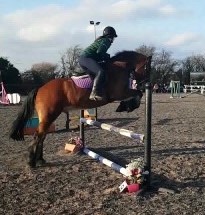
April 24, 2019, by Charlotte Gauja
Concussion Clinic | A Patient’s Story
Following the launch of the weekly University of Nottingham Concussion Clinic, a current patient of the injury clinic came forward to tell her a story of recovery after a fall from a horse that resulted in concussion.
“I was first diagnosed with light concussion in October 2017, when I fell off my horse whilst show jumping and knocked the side of my head. I was unconscious for a few seconds and ended up being taken to a walk-in centre, and then to QMC A&E. I had a chest x-ray and a CT scan which came back clear, and was sent home to rest. My symptoms were headaches, slight balance issues and tiredness, but these subsided after a few days and I was cleared back to play (or ride in my case!) after two weeks.”
“However, in February 2018, I had a very unlucky fall from a young horse and landed with my full weight on the back of my head and neck, breaking my riding hat with a crack. I went back to QMC A&E again, had another CT scan which came back clear. The advice with concussion is the same – lots of rest, breaks away from computer and phone screens and treat headaches with the usual pain killers, paracetamol and ibuprofen.”
“I went back home for two weeks after this – physically I had migraines consistently, was permanently exhausted and struggled with small tasks, such as reading. Even though I was sleeping and trying to listen to what my body was telling me – there was no real improvement in my symptoms. It was then when I was diagnosed with Post-Concussion Syndrome.”
“I went to go see Pete and the team and the Sports Injury Clinic for SCAT tests with slightly alarming results – around 20 balance errors and 21 out of the 24 concussion symptoms. Over time this got slightly better – I was doing SCAT tests every 2 or so weeks and saw a slow improvement, but not what you would expect. Pete recommended I went to chat to Dr Baker at Cripps Health Centre – a GP who is particularly interested in Sports Injuries and recommended I start on a low dose of Amitriptyline – a tricyclic antidepressant which is now mainly used in treatment of migraines and insomnia. Within a few weeks of amitriptyline, we saw massive improvements in symptoms, however still some major issues with balance.”
“In October 2018, after almost 8 months of continuous symptoms which were not fading, Pete and I went to a specialist concussion clinic at the Queen Elizabeth Hospital in Birmingham, where I did a range of tests (much like the SCAT, but more in depth) and I scored 45, higher than the ‘normal’ 38.”
“Professor Belli, one of the world leading experts on traumatic brain injury indicated that this result may not be due to the concussion at all – but a side effect of the Amitriptyline I was taking, therefore informed me to taper down the Amitriptyline and sent me to have an MRI scan just to be sure that there is nothing more sinister going on. My MRI came back clear and my symptoms vastly improved since coming off the Amitriptyline, and now over a year later I am concussion free! I wouldn’t be in the position where I am today, back riding (although nicer horses now) and my normal routine if it wasn’t for the help of the sports injury clinic and Pete and the team for their endless support, and the help from the concussion clinic over in Birmingham!”
Are you concerned about a concussion injury? Call the sports injury clinic on our number 0115 7487070 or visit our website.
No comments yet, fill out a comment to be the first

Leave a Reply